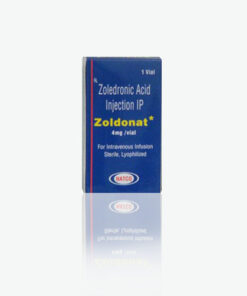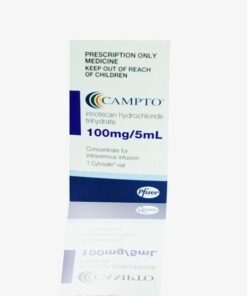Buy Adriamycin : Doxorubicin 50 Mg Injection Online
$44.88
Brand Name : Adriamycin
Composition : Doxorubicin
Manufactured by : Pfizer Pharmaceuticals, Inc.
Strength : 50 mg
Form : Injection
Packing : Pack of 1 Vial
Prescription Required:
Adriamycin is a chemotherapy medication that is used to treat various types of cancer such as breast cancer, ovarian cancer, lung cancer, lymphoma, and leukemia. The active ingredient in Adriamycin is Doxorubicin, which belongs to the class of drugs known as anthracyclines. It works by interfering with the growth and spread of cancer cells in the body.
Uses:
Adriamycin is mainly used to treat cancer. It is effective in treating the following types of cancer:
1. Breast cancer
2. Ovarian cancer
3. Lung cancer
4. Lymphoma
5. Leukemia
HOW TO USE:
Adriamycin is given as an injection by a doctor or nurse into a vein. It should never be injected into a muscle or under the skin. The dosage and frequency of the medication will be determined by the doctor and will depend on the type of cancer being treated, the patient’s medical condition, and response to treatment. Patients should follow the doctor’s instructions carefully.
Storage Conditions:
The medication should be stored at room temperature, away from direct sunlight, and out of the reach of children. It should not be frozen or refrigerated.
Mechanism of action:
Adriamycin works by damaging the DNA of cancer cells, which leads to their death. It does this by inhibiting the action of an enzyme called topoisomerase II, which is required for the replication and division of cancer cells.
Precautions:
Before using Adriamycin, patients should inform their doctor if they have any pre-existing medical conditions, including heart disease, liver disease, or kidney disease. They should also inform the doctor if they are pregnant or breastfeeding. Adriamycin may cause harm to an unborn baby and should not be used during pregnancy.
Contraindications:
Adriamycin should not be used in patients who are allergic to Doxorubicin or other anthracycline drugs. It should also not be used in patients with severe liver or kidney disease.
Drug Interactions:
Adriamycin may interact with other medications, including some antibiotics, antifungal drugs, and heart medications. Patients should inform their doctor of all medications they are taking, including over-the-counter medicines, vitamins, and herbal supplements.
Overdose:
If an overdose of Adriamycin is suspected, patients should seek immediate medical attention. Symptoms of an overdose may include fever, chills, nausea, vomiting, and low blood pressure.
Side effects:
Adriamycin may cause some side effects, including:
1. Nausea and vomiting
2. Hair loss
3. Fatigue
4. Mouth sores
5. Low blood cell counts
6. Heart damage
Patients should inform their doctor if they experience any side effects while taking this medication.
Be the first to review “Buy Adriamycin : Doxorubicin 50 Mg Injection Online” Cancel reply
Related products
Anti Cancer
Anti Cancer
Anti Cancer
Anti Cancer
Anti Cancer
Anti Cancer













Reviews
There are no reviews yet.